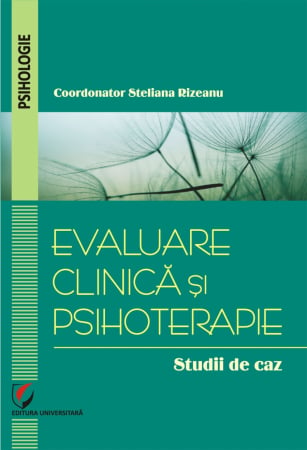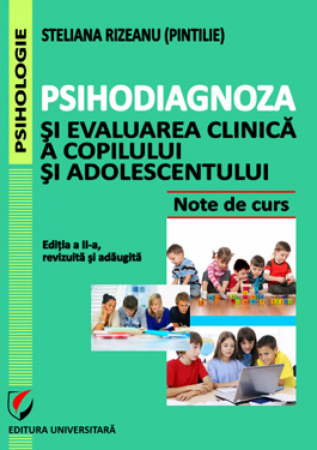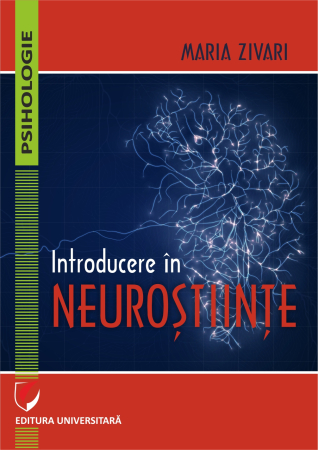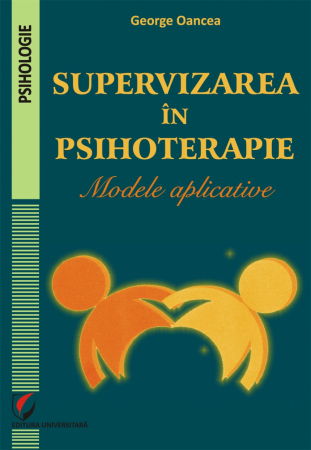ISBN: 978-973-749-887-8
Publisher year: 2010
Edition: I
Pages: 490
Publisher: Editura Universitară
Author: Mihai Anitei
- Description
- Download (1)
- Authors
- Content
- More details
- Reviews (0)
In the specialized literature of our country, the phrase "fundamentals of psychology" gradually slowed down, which, in previous years, was called general psychology. Then a separation of personality psychology from this framework was found. Various theorizations have been tried to justify one variant or another. It is certain that the volume of information has grown exponentially and any attempt to write the foundations of psychology or general psychology or whatever it is called, runs into major difficulties. First of all, it is necessary to select, organize and systematize the material according to well-established criteria and then "fill" this frame.
The truth is that this book was born as I developed the course on Fundamentals of Psychology (Cognitive Psychic Mechanisms) and Fundamentals of Psychology (Psychology of Stimulation and Regulation of Behavior). However, I gave up the order of the chapters in the course because I thought that this order was more logical. Thus, as was normal, I attached the chapter on attention immediately after the sensory-perceptive processes and before those of secondary processing of information (representation and thinking) due to the obvious relations of attention with this area of psychic life. Then I placed communication and language immediately after thinking, also due to the real presence of language in the area of cognitive processing of information. I left the will to the end because, in my opinion, it connects with the personality and is deeply involved in its structure.
If some chapters have a classic configuration and I am referring here to sensation, perception, representation, thinking, memory, imagination, other chapters, such as communication and language, motivation, affectivity, will bring a new presentation formula, new contents, what it brings them closer to current perspectives and makes them more attractive. I have in mind aspects such as: the motivation of personal action, the model of the four motivational-affective systems, robots and emotions or the relationship between will and free will. Of course, the other chapters also present updated information in relation to the latest models of approach in psychology.
Returning to the beginning of the book, the introductory chapter "Psychology as a science" proposes a different and more accessible approach to students. I avoided doing the philosophy of psychology because it is an arid issue that can be accessed and understood later than in the first year of college. I tried to present a new perspective of approaching psychology through which to argue its position as an autonomous science. I consider unproductive and out-of-date the debates in which we ask whether psychology is or is not a science. Things have been clarified and today no one questions rhetorically about this aspect.
Maybe it would be a terminological problem related to the process, mechanism, function, activity dispute. We appreciate that cognitive psychology has imposed the term processing, of "treating" information and, of course, we can also talk about "mechanisms" without making a mistake. Anyway, these disputes are, from a point on, sterile, because attention ends up being defined as a psychic "phenomenon", which is already far too vague. In the end, these labels are less important; it is important for the student to understand - from the content - the specifics of the psycho-behavioral manifestations discussed.
The chapter on the organization of psychic life offers a more modern perspective - especially as regards consciousness. The ground gained by the transpersonal, quantum view of states of consciousness deserves special attention.
Thus, the book offers openings towards various horizons of current psychology, without ignoring the contribution of the great personalities of Romanian psychology who marked this field and who were my teachers and predecessors: Paul-Popescu Neveanu, Mielu Zlate and Mihai Golu. I bring them this way my offering of gratitude.
In conclusion, I will mention the people without whom I could not have completed this book and to whom I present my deep appreciation and thanks: Ion Bucur, Elena Buzea, Mihaela Chraif, Cătălina Cicei, Andreea Dîrzu, Bogdana Humă, Ioana Iftime, Andreea Măţăuan, Sandra Spighel, Elena Stoica and Alexandru Vochiţă.
author
Bucharest,
April 23, 2010
-
Fundamentals of psychology - Mihai Anitei
Download

MIHAI ANITEI is a PhD university professor, doctoral supervisor at the Doctoral School of the Faculty of Psychology and Educational Sciences, University of Bucharest; associate professor at Titu Maiorescu University, Faculty of Psychology; the president of the College of Psychologists from Romania; practicing psychologist with over 40 years of experience in the field, principal psychologist and supervisor in the psychology of work, transport and services, judicial and educational.
Author or co-author of numerous works, among which we mention:
Experimental psychology, Polirom Publishing House, 2007
History of psychology, Psihomedia Publishing House, 2007
Psychological practice guide for students, co-authors Mihaela Chraif and Simona Trifu, Editura Universitara, 2010
The interview method in organizational psychology and human resources, main author Mihaela Chraif, Polirom Publishing House, 2011
Psychology in transport, main author Mihaela Chraif, Editura Universitara, 2013
Treatise on personality psychology, co-authors Mihaela Chraif, Vlad Burtaverde and Teodor Mihaila, Trei Publishing House, 2016
Chapter 1. PSYCHOLOGY AS A SCIENCE / 15
1.1. Psychic phenomena and the object of psychology / 17
1.2. Behavior and subjective experience / 20
1.3. The status of psychology as a science / 23
1.4. The roles and significance of psychology / 26
1.5. Structural models of psychology / 29
1.6. The place of psychology in the humanities / 31
1.7. Professional fields of psychology / 39
1.8. Branches of psychology / 42
Chapter 2. ORGANIZATION OF THE HUMAN PSYCH / 52
2.1. The conscious / 52
2.1.1. Preliminaries from the philosophy of science / 52
2.1.2. Paradigms of research on consciousness / 56
2.1.3. Difficulties and solutions in the scientific approach to consciousness. / 59
2.1.4. Arguments for an integrative theory of consciousness / 64
2.1.5. Approach models of consciousness / 76
2.1.6. The human psyche and consciousness / 81
2.1.7. Consciousness as a higher level of organization of the psyche / 84
2.1.8. Current controversies around consciousness / 86
2.2. The unconscious / 96
2.2.1. Definition / 98
2.2.2. Contents / 100
2.2.3. Functions / 102
2.2.4. Relations / 104
2.2.5. The role in mental life / 107
Chapter 3. THE SENSATION / 110
3.1. From excitability to sensitivity / 110
3.2. Definition and psychological specificity of sensations / 111
3.3. The qualities of sensations / 114
3.4. Laws of sensitivity / 115
3.5. Visual sensations / 120
3.6. Auditory sensations / 123
3.7. Gustatory sensations / 126
3.8. Olfactory sensations / 130
3.9. Skin sensations / 134
3.10. Proprioceptive-kinesthetic and balance sensations / 138
Chapter 4. PERCEPTION / 143
4.1. Theories of perception / 143
4.2. Definition and psychological specificity / 146
4.3. Phases of the perceptual process / 149
4.4. The roles of perception / 152
4.5. The determining factors of perception / 153
4.6. Laws of perception / 157
4.7. Complex forms of perception / 163
4.8. Perceptual illusions / 171
Chapter 5. ATTENTION / 176
5.1. Current models and perspectives in the attention approach / 176
5.2. Orientation reaction / 185
5.3. Vigilance / 186
5.4. Mechanisms of attention / 187
5.5. Psychological characterization of attention / 191
5.6. Attention and behavior / 194
5.7. Forms of attention / 196
5.8. The qualities of attention / 198
Chapter 6. REPRESENTATION / 200
6.1. Perspectives in the representation approach / 200
6.2. The genesis of representation / 202
6.3. Definition and specificity of representation / 204
6.4. Mechanisms of representation / 205
6.5. The qualities of representation / 207
6.6. Classification of representations / 208
Chapter 7. THINKING / 212
7.1. Perspectives in the approach to thinking / 212
7.2. Thinking as a higher cognitive process / 219
7.3. Operations of thought / 221
7.4. Categorization – concept and prototype / 224
7.5. Reasoning / 231
7.6. Understanding / 233
7.7. Problem Solving / 234
Chapter 8. COMMUNICATION AND LANGUAGE / 243
8.1. Definition and explanatory models of communication / 243
8.2. Language and language / 253
8.3. The neurophysiological bases of language / 256
8.4. Language production and understanding / 259
8.5. The structure and components of speech / 263
8.6. The genesis of language / 266
8.7. Language development / 270
8.8. Functions of language / 273
8.9. Language forms / 278
8.9.1. Oral language / 279
8.9.2. The written language / 281
8.9.3. Internal language / 284
8.10. The relationship between thought and language / 286
8.11. Nonverbal communication / 288
8.11.1. Kinesics or the study of body movements / 290
8.11.2. Proxemics or the perception and use of space / 291
8.11.3. Chronology / 292
8.11.4. Posture / 293
8.11.5. Gestures / 293
8.11.6. Haptics / 294
8.11.7. Ophthalmology / 294
8.11.8. Paralanguage / 294
Chapter 9. MEMORY / 296
9.1. Approach models / 296
9.2. Definition and characterization / 300
9.3. Memory processes / 303
9.3.1. Encoding / 303
9.3.2. Storage / 306
9.3.3. Update / 308
9.4. Forms of memory / 311
9.4.1. Sensory memory / 311
9.4.2. Short-term memory / 313
9.4.3. Long-term memory / 317
9.5. Forgetting / 320
Chapter 10. IMAGINATION / 323
10.1. Controversial aspects in the approach to imagination / 323
10.2. Definition and characterization of imagination / 325
10.3. Mechanisms of imagination / 328
10.4. Forms of imagination / 336
10.5. Processes of imagination / 344
Chapter 11. MOTIVATION / 347
11.1. Theories of motivation / 347
11.2. The concept of need / 358
11.3. The concept of reason / 365
11.4. Forms of motivation / 367
11.5. The functions of motivation / 373
11.6. Motivation of personal action / 374
11.6.1. Place of control / 374
11.6.2. Consciousness of one's own efficiency / 376
11.6.3. Theory of acquired helplessness / 378
11.6.4. Attribution theory / 381
11.7. Optimum motivation and performance / 383
11.8. Aspiration and expectation / 385
11.9. Frustration, aggression and stress / 387
11.9.1. Frustration / 387
11.9.2. Aggressiveness / 389
11.9.3. Stress / 391
Chapter 12. AFFECTIVENESS / 393
12.1. Affectivity theories / 393
12.1.1. Mechanistic theories / 394
12.1.2. Cognitivist theories / 396
12.1.3. Theories of emotional pragmatics (functionalist theories) / 399
12.2. The model of the four motivational-affective systems: anger, joy, sadness and fear / 401
12.2.1. Fury / 402
12.2.2. Joy / 407
12.2.3. Sadness / 411
12.2.4. Fear / 415
12.3. Affectivity and behavior / 420
12.3.1. Anxiety / 420
12.3.2. Stress / 422
12.4. Classification of emotions / 425
12.5. The role of affectivity in human activity / 429
Chapter 13. WILL / 435
13.1. Models of approach and disputes related to the place of will in psychology / 435
13.2. Integration levels and the evolution of regulation forms / 442
13.3. Genesis of the will / 446
13.4. Definition and psychological characterization / 449
13.5. The structure and phases of the voluntary act / 454
13.6. Will and thought / 459
13.7. Postvoluntary acts / 468
13.6. Qualities of the will / 470
BIBLIOGRAPHY / 472
The truth is that this book was born as I developed the course on Fundamentals of Psychology (Cognitive Psychic Mechanisms) and Fundamentals of Psychology (Psychology of Stimulation and Regulation of Behavior). However, I gave up the order of the chapters in the course because I thought that this order was more logical. Thus, as was normal, I attached the chapter on attention immediately after the sensory-perceptive processes and before those of secondary processing of information (representation and thinking) due to the obvious relations of attention with this area of psychic life. Then I placed communication and language immediately after thinking, also due to the real presence of language in the area of cognitive processing of information. I left the will to the end because, in my opinion, it connects with the personality and is deeply involved in its structure.
If some chapters have a classic configuration and I am referring here to sensation, perception, representation, thinking, memory, imagination, other chapters, such as communication and language, motivation, affectivity, will bring a new presentation formula, new contents, what it brings them closer to current perspectives and makes them more attractive. I have in mind aspects such as: the motivation of personal action, the model of the four motivational-affective systems, robots and emotions or the relationship between will and free will. Of course, the other chapters also present updated information in relation to the latest models of approach in psychology.
Returning to the beginning of the book, the introductory chapter "Psychology as a science" proposes a different and more accessible approach to students. I avoided doing the philosophy of psychology because it is an arid issue that can be accessed and understood later than in the first year of college. I tried to present a new perspective of approaching psychology through which to argue its position as an autonomous science. I consider unproductive and out-of-date the debates in which we ask whether psychology is or is not a science. Things have been clarified and today no one questions rhetorically about this aspect.
Maybe it would be a terminological problem related to the process, mechanism, function, activity dispute. We appreciate that cognitive psychology has imposed the term processing, of "treating" information and, of course, we can also talk about "mechanisms" without making a mistake. Anyway, these disputes are, from a point on, sterile, because attention ends up being defined as a psychic "phenomenon", which is already far too vague. In the end, these labels are less important; it is important for the student to understand - from the content - the specifics of the psycho-behavioral manifestations discussed.
The chapter on the organization of psychic life offers a more modern perspective - especially as regards consciousness. The ground gained by the transpersonal, quantum view of states of consciousness deserves special attention.
Thus, the book offers openings towards various horizons of current psychology, without ignoring the contribution of the great personalities of Romanian psychology who marked this field and who were my teachers and predecessors: Paul-Popescu Neveanu, Mielu Zlate and Mihai Golu. I bring them this way my offering of gratitude.
In conclusion, I will mention the people without whom I could not have completed this book and to whom I present my deep appreciation and thanks: Ion Bucur, Elena Buzea, Mihaela Chraif, Cătălina Cicei, Andreea Dîrzu, Bogdana Humă, Ioana Iftime, Andreea Măţăuan, Sandra Spighel, Elena Stoica and Alexandru Vochiţă.
author
Bucharest,
April 23, 2010

6359.png)
![Fundamentals of psychology - Mihai Anitei [0] Fundamentals of psychology - Mihai Anitei [0]](https://gomagcdn.ro/domains/editurauniversitara.ro/files/product/medium/fundamentele-psihologiei-2284-417243.gif)
![Fundamentals of psychology - Mihai Anitei [1] Fundamentals of psychology - Mihai Anitei [1]](https://gomagcdn.ro/domains/editurauniversitara.ro/files/product/medium/fundamentele-psihologiei-mihai-anitei-327255.png)
![Fundamentals of psychology - Mihai Anitei [1] Fundamentals of psychology - Mihai Anitei [1]](https://gomagcdn.ro/domains/editurauniversitara.ro/files/product/large/fundamentele-psihologiei-2284-417243.gif)
![Fundamentals of psychology - Mihai Anitei [2] Fundamentals of psychology - Mihai Anitei [2]](https://gomagcdn.ro/domains/editurauniversitara.ro/files/product/large/fundamentele-psihologiei-mihai-anitei-327255.png)













